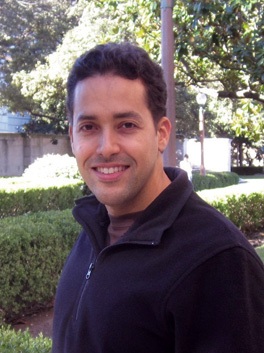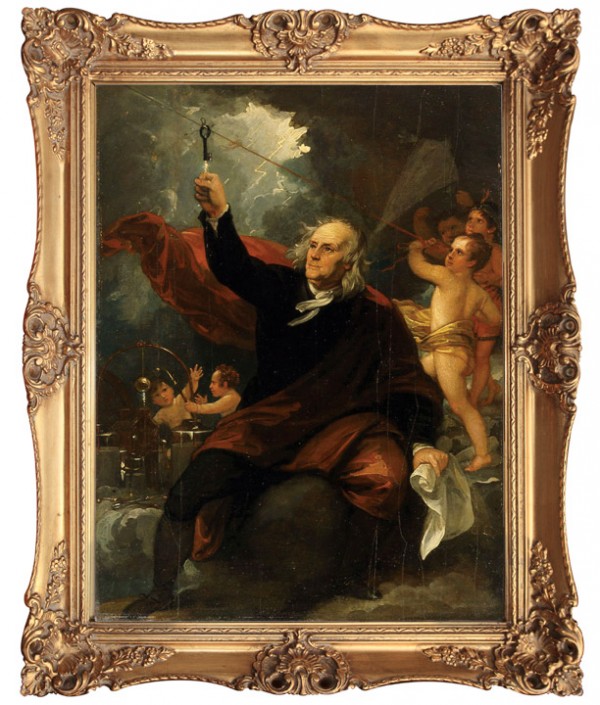Legend has it Benjamin Franklin ventured out on a stormy day to fly a kite with a lightning rod and a key dangling on the end of the string. When the lightning struck the kite, the powerful bolt charged the metal key. Franklin then touched the key and got zapped, thus proving the electrical nature of lightning.
It is a captivating story. Yet just as Pecos Bill never rode a giant catfish down the Rio Grande River, the venerable Benjamin Franklin didn’t discover electricity with his kite. This famous myth is one of several tall tales in science history that Alberto Martínez, associate professor of history at The University of Texas at Austin, examines in his book “Science Secrets: The Truth about Darwin’s Finches, Einstein’s Wife, and Other Myths” (University of Pittsburgh Press, May 2011).
From Newton’s discovery of universal gravity to Einstein’s belief in God, Martínez analyzes, debunks and demystifies some of the most captivating legends in science.
How did you get interested in studying the history of science?
When I was in college I wanted to understand Einstein’s theory of relativity. I could do the math and say the catch phrases but still felt that I didn’t really understand it. So I started reading Einstein’s own writings. I became fascinated by questions of interpretation in physics, which led me to the history of science.
What is one of the most surprising myths that you refute in your book?
Remember the famous tall tale about Galileo dropping objects from the Leaning Tower of Pisa? Well it’s surprising that a similar story has evolved about Albert Einstein: that he discovered the relativity of time by thinking about Swiss clock towers. This story is told by well-known historians and physicists, such as Peter Galison, Michio Kaku and Hans C. Ohanian. It has also been echoed in books on literature, science literacy, Swiss tourism, economics and politics. But it’s just fiction. In “Science Secrets” I trace how this myth arose and evolved. Writers have also linked Einstein’s theory to his job as a patent examiner in Switzerland, as if he had been inspired by analyzing patents for synchronizing clocks. But that too is just fiction. There’s no evidence that he analyzed any such applications.

What is an interesting fact that is more captivating than a myth?
It is commonly said that Copernicus and Galileo followed the ancient philosopher Pythagoras in saying that Earth moves around the Sun. But actually, there’s no evidence that Pythagoras claimed any such thing. So instead of repeating this myth, I researched the actual historical connections between the legend of Pythagoras, the Copernican Revolution and the Catholic Church. I was stunned to discover a major, neglected dimension, that because Pythagoras was the leader of a secretive pagan cult, some Christian writers denounced his “enormous and endless heresies” for centuries: that Pythagoras was a demigod reborn many times, that he worshiped the Sun god Apollo, that he made miracles and magic, talked with the dead in hell, divined the future. In this context, it makes more sense why Catholic churchmen were so very alarmed by Galileo’s defense of “the false Pythagorean doctrine” that Earth circles the Sun.
Did you discover a common thread to these myths?
Sure, there are several. These are inspiring stories about ordinary but interesting individuals who struggled against difficult odds and discovered apparently impossible results, thanks to some trivial thing.
Also, the character of Pythagoras shows up in many fields: astronomy, music, mathematics, alchemy, etc. But most of those stories are just myths. People have such a strong desire to know the past that they often invent it.
They posit an ancient “founding father” onto whom they project whatever noble qualities and discoveries seem plausible. Even Isaac Newton, having formulated the inverse square law of gravity, later attributed it to Pythagoras! Why?
A similar pattern of misrepresenting the past has affected how people refer to Einstein. Speculations evolve into alleged anecdotes that even lead to scholarly studies. Laypersons, scientists and history professors are all vulnerable to the charm of “likely stories.”
What is something about an iconic scientist like Darwin or Einstein that might startle your readers?
Many people still learn that Darwin was inspired to conceive the Theory of Evolution by studying finches of the Galápagos Islands. But it’s not true.
Clear-cut facts about mockingbirds and frogs were better evidence for Darwin.
As for Einstein, writers have contrived reasons why he made his Theory of Relativity: that his wife was his secret co-worker, that he was influenced by patent applications, modern art or mystical beliefs about God. But no, these are all just myths. Surprisingly, there’s more evidence that Einstein was influenced by, of all things, developmental psychology. I’m not saying that this was the most important factor (optics and electrodynamics were far more important), just that it was more important than the factors I just mentioned.
Another example: writers inadvertently misrepresent Einstein’s views on God because they don’t quote certain clear-cut statements he made. This is true even of Max Jammer’s excellent book “Einstein and Religion” and Water Isaacson’s “Einstein,” which was a New York Times No.1 bestseller.
Is there a scientific myth in particular that you find to be the most fascinating?
I love the story about Ben Franklin’s kite, which is in the book. Regardless of its truth or falsehood, it’s fascinating to imagine this guy having the courage and stupidity to fly a kite in a thunderstorm, and that he used a child’s toy to draw “electrical fire” from the sky. It has the shape of a classic myth: the story of Prometheus, who used a long stalk of fennel to steal fire from the god of sky and thunder.
What insights can we gain by looking back at famous myths in science?
I think we should debunk historical myths so that when we talk about scientific creativity our claims are based on evidence instead of fiction. We need to discuss myths that appear in science textbooks to replace them with accurate accounts so that readers can think about the ideas, circumstances and processes that really helped the sciences grow. Also, by tracing the evolution of myths it’s amazing to see how speculations become misconstrued as history. When writers use expressions such as probably,” “she may have,” “he must have,” and so forth, we later get accounts that echo those claims as actual happenings. We see the same kind of problem happening in the news these days: Reporters and commentators make too many speculations, rather than getting to the substance. I mean, tell me: What actually happened? What do we really know?
